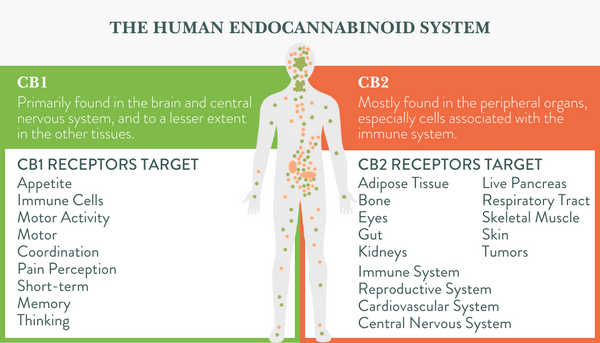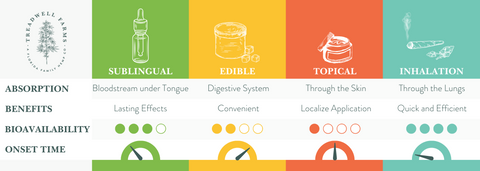Unraveling the Mystery: How Does CBD Work in the Body?

Hey there, curious minds!
Have you ever wondered how CBD works in your body? If so, you're in the right place.
Let’s dive into the fascinating world of CBD, short for cannabidiol, and explore how it interacts with your body's systems to promote wellness.
The Basics of CBD
First things first, let's talk about what CBD is. CBD is a naturally occurring compound found in the cannabis plant, along with hundreds of other cannabinoids. Unlike its cousin THC (tetrahydrocannabinol), CBD is non-psychoactive, which means it won't get you "high."
The Endocannabinoid System (ECS) Demystified
To understand how CBD works, we need to introduce you to your body's secret weapon – the endocannabinoid system (ECS). The ECS is a complex network of receptors, enzymes, and endocannabinoids (cannabinoids produced by your body). Its primary role is to maintain homeostasis, which is the balance and stability of your body's internal environment.

How CBD Interacts with the ECS
Now, let's get into the nitty-gritty of how CBD interacts with the ECS. When you consume CBD, whether through oils, gummies, or topicals, it interacts with two main cannabinoid receptors in the ECS – CB1 and CB2 receptors1.
- CB1 Receptors: These receptors are primarily found in the brain and central nervous system. When CBD binds to CB1 receptors, it can influence functions like mood, appetite, pain perception, and memory.
- CB2 Receptors: These receptors are mainly located in the immune system and peripheral organs. CBD's interaction with CB2 receptors can help modulate inflammation and immune responses.
The Power of CBD's Mechanisms
CBD doesn't just stop at interacting with cannabinoid receptors. It also influences other systems and processes in the body through various mechanisms:
- Enhancing Endocannabinoid Production: CBD may enhance the production of your body's own endocannabinoids, such as anandamide, which plays a role in mood regulation.2
- Inhibiting Enzymes: CBD can inhibit enzymes like FAAH (fatty acid amide hydrolase), which breaks down anandamide. By inhibiting FAAH, CBD helps increase the levels of anandamide, promoting feelings of bliss and relaxation.3
- Interacting with Serotonin Receptors: CBD interacts with serotonin receptors, particularly the 5-HT1A receptor, which is involved in mood and anxiety regulation. This interaction contributes to CBD's potential calming and anti-anxiety effects.4
CBD's Journey in Your Body
When you consume CBD, whether orally or topically, it embarks on a fascinating journey in your body:
- Oral Consumption: If you take CBD orally, such as through oils or capsules, it passes through your digestive system and liver before entering your bloodstream. This process, known as the first-pass effect, can reduce the bioavailability of CBD. However, innovations like nanoemulsion technology can enhance CBD's absorption and bioavailability.
- Sublingual Administration: Taking CBD sublingually (under the tongue) allows it to bypass the digestive system to some extent, entering your bloodstream directly through the mucous membranes. This method can result in faster onset and higher bioavailability compared to oral ingestion.
- Topical Application: Applying CBD topically, such as with creams or balms, allows it to interact with cannabinoid receptors in the skin, muscles, and joints. While the absorption rate may be slower compared to oral or sublingual methods, topicals provide targeted relief to specific areas.

CBD's Impact on Wellness
So, what does all this mean for you? CBD's versatile interactions and mechanisms in the body make it a potential ally in promoting overall wellness. From supporting mood balance and stress management to aiding in pain relief and enhancing sleep quality, CBD offers a holistic approach to well-being.
As we wrap up our journey into the world of CBD and its workings in the body, remember that CBD's effects can vary from person to person. Factors like dosage, frequency of use, individual physiology, and product quality can all influence your CBD experience. It's always a good idea to start with a lower dose, observe how your body responds, and adjust as needed. Read more about how to dose CBD here.
Here's to unlocking the secrets of CBD and embracing a wellness journey that's as unique as you are!
Sources
- Grinspoon, MD, Peter; The endocannabinoid system: Essential and mysterious; Harvard Health Publishing at Harvard Medical School; April 2021; https://www.health.harvard.edu/blog/the-endocannabinoid-system-essential-and-mysterious-202108112569
- Henson JD, Vitetta L, Quezada M, Hall S. Enhancing Endocannabinoid Control of Stress with Cannabidiol. J Clin Med. 2021 Dec 14;10(24):5852. doi: 10.3390/jcm10245852. PMID: 34945148; PMCID: PMC8704602.
- Devi, L. A. (2020). Diversity of molecular targets and signaling pathways for CBD. Pharmacology Research & Perspectives, 8(6), e00682. https://doi.org/10.1002/prp2.682
- Melas, P.A.; Scherma, M.; Fratta, W.; Cifani, C.; Fadda, P. Cannabidiol as a Potential Treatment for Anxiety and Mood Disorders: Molecular Targets and Epigenetic Insights from Preclinical Research. Int. J. Mol. Sci. 2021, 22, 1863. https://doi.org/10.3390/ijms22041863






